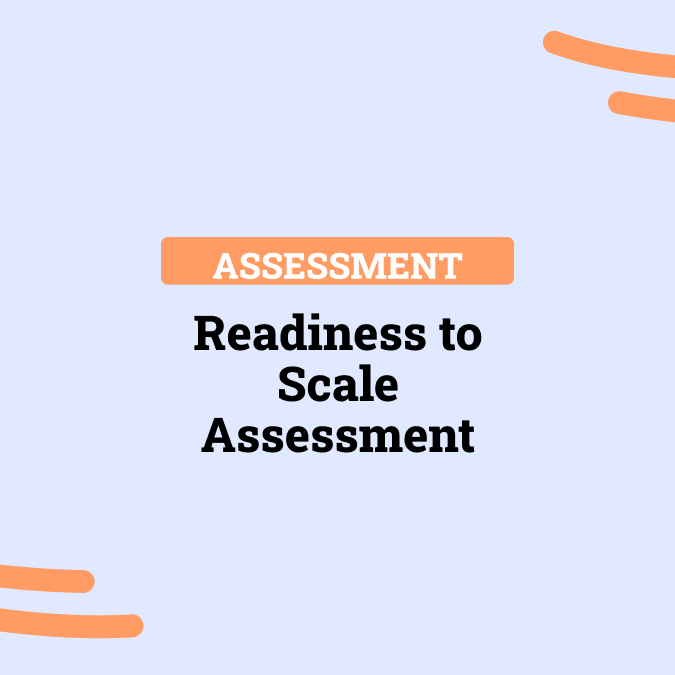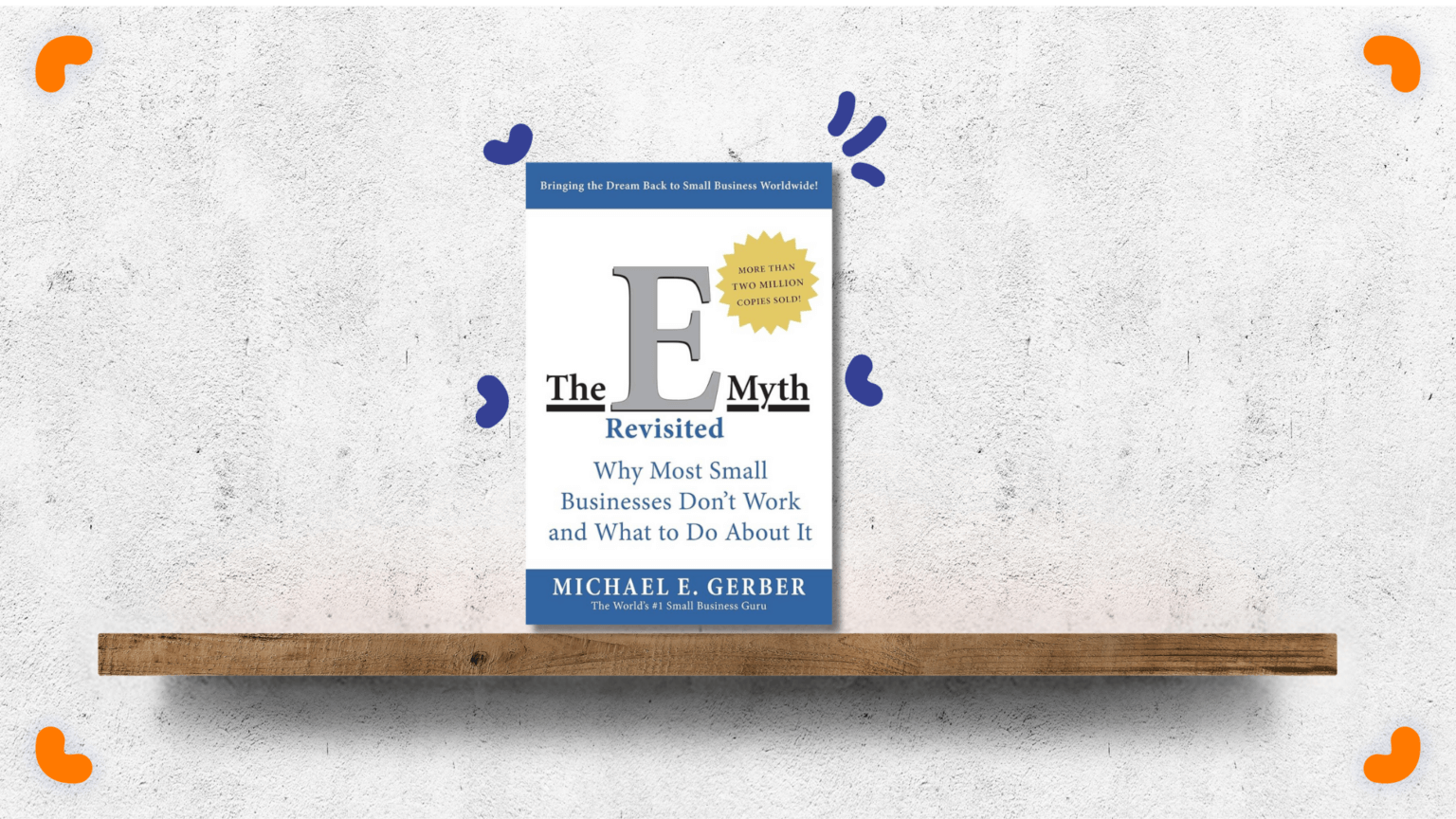Introduction
The iconic E-Myth Revisited by Michael E. Gerber is one of the most-read business books of all time. It dispels the myth of entrepreneurship and teaches how to build a successful business utilizing systems and processes.
Today, we’re doing an eMyth Revisited book review and exploring 5 key takeaways from the book.
Who needs to read this book?
- Anyone who owns or wants to own a small business.
- Business owners trying to turn their struggling business into a successful one.
- Anyone who thinks entrepreneurship is simply about having the right technical skills.

Book Summary
In E-Myth Revisited, Michael E. Gerber delves into the core reasons why most small businesses fail and provides insights on overcoming these challenges. He introduces the concept of the E-Myth, which stands for the Entrepreneurial Myth, suggesting that the primary reason small businesses fail is not due to a lack of skill in their craft but a lack of understanding of what it takes to run a business effectively.
Similar to Traction, the book is structured to guide small business owners through the process of working on their business, not just in it, by applying systematic methods to business operations.
Gerber emphasizes the importance of seeing the business as a separate entity from the owner, which requires a balance between the entrepreneur’s vision, the manager’s pragmatism, and the technician’s skill set. This balance is crucial for creating a business that can operate efficiently and grow beyond the initial capabilities of the owner
So what exactly is the E-Myth?
The E-Myth (“Entrepreneurial Myth”) is the mistaken belief that most businesses are started by people with tangible business skills, when in fact, most are started by “technicians”.
Hence, most new businesses fail because these are varying skill sets.
❌ The assumption by most entrepreneurs is that expertise in a technical field will naturally translate into success in a business that operates within that field.
This is not the case, as entrepreneurship requires a unique set of skills.
Actually, Gerber emphasizes the importance of understanding three distinct roles within a business: the entrepreneur, the manager, and the technician.
- The entrepreneur is the visionary who dreams of starting a business,
- The the manager is responsible for planning and organizing,
- And the technician is the one who performs the technical work.
According to Gerber, small business owners often get stuck in the technician role, neglecting the other critical aspects of running a business.
Balancing these roles is essential for a well-rounded business strategy.
Why the book is all about process?
"The E–Myth Revisited" remains one of the most trusted books for learning how to scale and run a business.
At it’s core, the eMyth revisted is all about process and systemization.
eMyth Book Review: 5 Process Takeaways
We’ve taken 5 key concepts from the book and shared the takeaway to remember. These golden nuggets may just turn your business into the next million-dollar business and your life into a joy!
These ideas contribute to a holistic view of business that values planning, systems, and strategic growth over mere technical expertise or hard work.
1. The Turn-Key Revolution 🔑
💡 Takeaway – create a business that can run without you.
The Franchise Prototype, introduced through the success of McDonald’s, serves as a blueprint for creating a business that is efficient, scalable, and capable of delivering consistent value to customers.
This idea promotes the development of businesses that operate efficiently without the owner’s constant input, much like a franchise. It stresses the importance of creating systems and processes that can function independently, ensuring business continuity and consistency.
This model not only facilitates the replication of success across multiple locations but also underscores the significance of the business itself as the primary product rather than the goods or services it offers.
2. Understand where your business is at 👶
💡 Takeaway – if you know where your business is at, you can scale appropriately
The book likens a business’s development to a child’s growth stages, suggesting that a business must undergo a series of predictable stages. Understanding these stages allows for better planning and management of business evolution.
Infancy:
This is the start-up phase of your business when you act as a Technician doing all the work of the business by yourself. In this phase, you devote everything to your business regardless of the toll it takes on you personally.
🟡 DOCUMENT TO LAY A FOUNDATION TO SCALE
Adolescence:
In this stage of your business, you begin to experience growth. You hire employees to take over some of the tasks that used to overwhelm you. But soon you find that things aren’t getting done the way you want them to be done. Your employees lack the motivation and drive that you put into your business.
🔵 TRAIN TO UNLOCK GROWTH
Maturity:
At this stage, the business owner has evolved like a butterfly. Not only are their business systems well-developed but they have also grown tremendously as a person (likely committed to lifelong learning).
🟢 USE ANALYTICS TO SCALE-UP
Take the Whale Readiness to Scale Assessment to find out where you are.

3. Work on your business, not In it 👩🚀
💡 Takeaway – Work on scaling the business, not making it run
Gerber emphasizes the critical distinction between working “on” your business versus working “in” it. This perspective encourages business owners to step back from day-to-day operations to focus on strategic growth and systematization.
This shift focuses on growth, scalability, and systematization rather than getting bogged down in routine tasks.
The aim is to create a business that operates efficiently without the constant involvement of the owner, allowing them to focus on expanding the business and improving its systems. By treating the business as a product that needs to be refined and perfected, entrepreneurs can create a model that not only meets the needs of their customers but also operates predictably and profitably on its own.
4. The Franchise Prototype 🍟
💡 Takeaway – create your business as if it were a franchise, then build the first store/branch.
Gerber proposes that every business should be conceptualized as if it will be franchised. This involves creating detailed documentation of every operation ensuring the business model is replicable and scalable.
The Franchise Prototype is the cornerstone of the Turn-Key Revolution, representing a complete, operational model that demonstrates how the business works in practice. This prototype serves as a test bed for all aspects of the business, ensuring that each component functions effectively before being implemented on a larger scale.
5. The Importance of Systematization 🏋️♂️
💡 Takeaway – create a business that continuously improves through process
The emphasis on systematization underlines the need for standardized processes in every aspect of the business. This ensures efficiency, quality control, and the ability to scale the business effectively without diminishing the quality of the product or service offered.
We obviously cannot emphasize the importance of systemization enough.
Bottom line - You must read the e-Myth Revisted
Michael E. Gerber is a true legend of entrepreneurship. Inc. Magazine calls him “the World’s #1 Small Business Guru”.
He says that entrepreneurs are doers, thinkers, visionaries and storytellers. And that anyone can create the business of your dreams based on your purpose PROVIDED you create systems that will support your creation.
We hope you enjoyed our book review of the eMyth Revisited. Feel free to take our Assessment below to identify how to scale your business.

Readiness to Scale Assessment
Almost everyone wants to scale their business but where to start? Take our Readiness to Scale Assessment to find out! You’ll be presented with 10 statements that correlate to one of three specific scaling stages in business.







